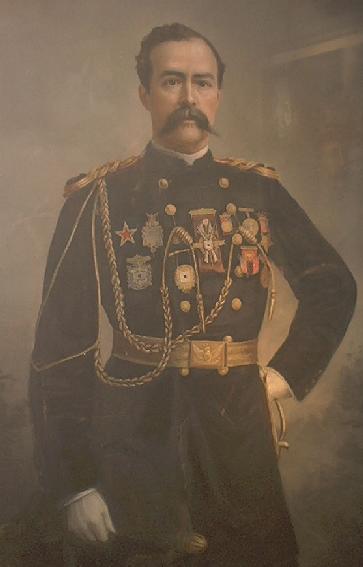
Henry Alger Gildersleeve
(post-war image)
Henry Alger Gildersleeve (1840-1923)
(Picture History)
Return to the 150th Regiment Home Page
Henry Alger Gildersleeve Obituary
From the July 1, 1923, issue of American Rifleman magazine
Early in April, at his home in New York City, Judge Henry Alger Gildersleeve died at the age of 83. Born on a farm in Dutchess County, N.Y., in 1840, he recruited a company from his home township in 1862, served through the Civil War, mostly with Sherman’s Army, and with the close of hostilities, having been brevitted Lieutenant Colonel by Lincoln for gallant and meritorious services, he began his civil career at the age of 25. While devoting his attention to the duties of his profession, Colonel Gildersleeve did not lose his interest in military matters. In 1870 he was chosen Lieutenant Colonel of the 12th Regiment of the National Guard of the State of New York, and the same regiment chose as Major S. V. R. Cruger, formerly his brother officer in the 150th. During the Orange riots in New York City, in 1871, Colonel Gildersleeve had command of the 12th Regiment, which was assigned to the defense of the State Arsenal at 35th Street and 7th Avenue. Soon after entering the National Guard, Colonel Gildersleeve was deeply impressed by the ignorance of the guardsmen in the practical use of their rifles. Men served their entire time of enlistment without firing a single ball cartridge, received no instruction in marksmanship, and had no knowledge of it whatever. To remedy this state of affairs, Colonel Gildersleeve helped to organize the National Rifle Association of America, the object of which was “to encourage the rifle practice and to promote a system of aiming drill and target firing among the National Guard.” Of this association Colonel Gildersleeve was one of the incorporators and directors , and for years he devoted much time and energy to its service as Secretary and later as President. It was on the range of this association at Creedmoor, while preparing himself to instruct his regiment in rifle practice, that he acquired the skill in marksmanship which soon made him famous. Possessing in a high degree, the natural qualifications of good eyesight, rare nerve, excellent judgement and application, he soon succeeded in carrying off many prizes in various competitions. In 1874 he first came into national prominence as a rifleman by his work as a member of the American Rifle Team in its first contest with the Irish team at Creedmoor. This exciting match the Americans won by a narrow margin. Colonel Gildersleeve’s work in this great contest had shown that he was in the foremost rank of marksmen. When, in the following year, it was decided to send a party of riflemen to Great Britain, and give the Irish a return match, he was unamimously chosen captain of the team. The party sailed from New York on the S. S. “City of Chester” of the Inman Line, June 5th, 1875. They were received in Dublin with genuine Irish enthusiasm, and entertained with warm and generous hospitality. The match came off at Dollymount on June 29th in the presence of twenty thousand spectators and resulted in a pronounced victory for the Americans. The American riflemen also took part in competitions in England and Scotland, and won many individual victories in brilliant style. Colonel Gildersleeve captained the expedition, his public speeches, and his individual skill in the contests were eminently satisfactory to the members of his party and to his countrymen at home. The victory stirred the American people to great manifestations of joy, and the team were received, upon their arrival in New York, with demonstrations befitting the return of heroes from a successful war. Colonel Gildersleeve in 1876 embodied the lessons of his experience in a book entitled Rifles and Marksmanship which obtained wide circulation. Governor Dix offered him the position of General Inspector of Rifle Practice in the State of New York, but he declined the proferred honor. Meanwhile, he continued active service in the National Guard. In October, 1874, he had been chosen Assistant Adjutant General and Chief of Staff in the First Division in this State, with the rank of Colonel. He was later elected Colonel of the 9th Regiment, but refused this honor, preferring to remain Assistant Adjutant General. This latter position he held for more than twelve years. When the National Guard organization in New York City was reduced to a brigade, Colonel Gildersleeve was placed on the list of reserves, and thus ended his active military life. His long and honorable judicial career began in 1875, when he was elected Judge of the Court of General Sessions in the city of New York by a large majority, running considerably ahead of the rest of his ticket. For fourteen years he sat on the Bench of that Court, disposing of over 15,000 criminal cases of every kind and description; and in that immense number only two of his decisions were reversed by a higher court. Although nearly 83 years old at the time of his death, he kept up his interest in outdoor sports to the last; he still enjoyed his fishing and hunting, and was a well known golfer. His numerous clubs reflected his interest in sports. An agreeable public speaker, his services in this capacity were much in demand.

Henry Alger Gildersleeve
(post-war image)
Henry Alger Gildersleeve (1840-1923)
(Picture History)
Return to the 150th Regiment Home Page